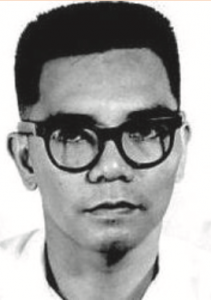
The Department of Linguistics (DL) of the UP Diliman (UPD) College of Social Sciences and Philosophy celebrated the life and work of Ernesto Constantino, avid folklorist and a pioneering figure in Philippine linguistics last Aug. 25 with “Paglingon,” a lecture series held at the Bulwagan ng Dangal.
Constantino served the university for 36 years beginning in 1959 as an Assistant Professor of Linguistics until his retirement as University Professor in 1995.
The academician. He worked with the 1971 and 1986 Constitutional Commissions, during which he contributed significantly to the adoption and development of the Filipino national language as part of the pool of experts consulted. The 1986 Constitutional Commission eventually adopted Filipino as the national language.
Constantino was chairman of the Departamento ng Filipino at Panitikan ng Pilipinas (DFPP) and DL from 1969 to 1972.
“Paglingon” featured guest speakers who worked for or with Constantino in UPD like former student Dr. Rosario Torres-Yu of the DFPP, former research assistant Dr. Viveca Hernandez of the DL, fellow folklorist Prof. Melecio C. Fabros III of the DFPP and former linguistics professor Dr. Anicia Del Corro.
Torres-Yu talked about her various interactions with Constantino, vividly recalling their first interaction when she was student assistant at the department. It was also him who invited then the newly graduated Torres-Yu and Prof. Lilia Antonio to join the University in 1971.
Hernandez discussed three of Constantino’s researches that became landmarks in Philippine linguistics: his unpublished dissertation on the grammar of a dialect of Ilokano in 1959, “The sentence patterns of twenty-six Philippine Languages,” published in 1965 in the journal Lingua and “The deep structures of the Philippine Languages” published in 1972 in Langues et Techniques, Nature et Societ.
The folklorist. Constantino co-founded the University of the Philippines Folklorists, Inc. and accumulated a good amount of Philippine folklore materials during his career.
It was in this spirit that Fabros presented his lecture “Hidilyn F. Diaz: Sulyap sa isang epiko at iba pang poklor,” in which he talked about the Olympic silver medalist, likening her story to that of an epic hero’s journey.
Del Corro’s lecture “Heterogenous language in Bible translation: A sequel, a tribute,” presented her work with the Philippine Bible Society using heterogeneous language.
In heterogeneous languages such as Taglish, words and elements from the source languages remain distinct and recognizable while still being used together in writing and conversation.
She attributes her preference for using heterogeneous language for translation to Constantino’s influence.
In closing, Prof. Farah Cunanan of the DL commended Constantino’s scholarship, citing his tenacity and perseverance in gathering data despite living in an age without the benefits of very mobile technology.
Constantino was born on Aug. 25, 1930 in Sto. Domingo, Nueva Ecija. He earned a degree in AB English (cum laude) from UP in 1953 before finishing his PhD in Linguistics from Indiana University in 1959. He passed away on Jun. 21.
